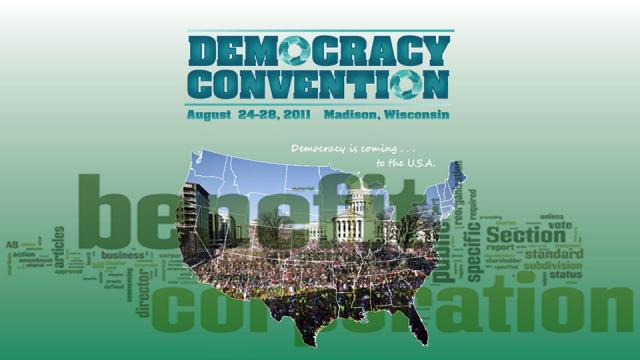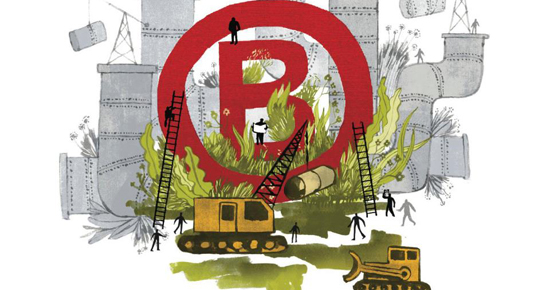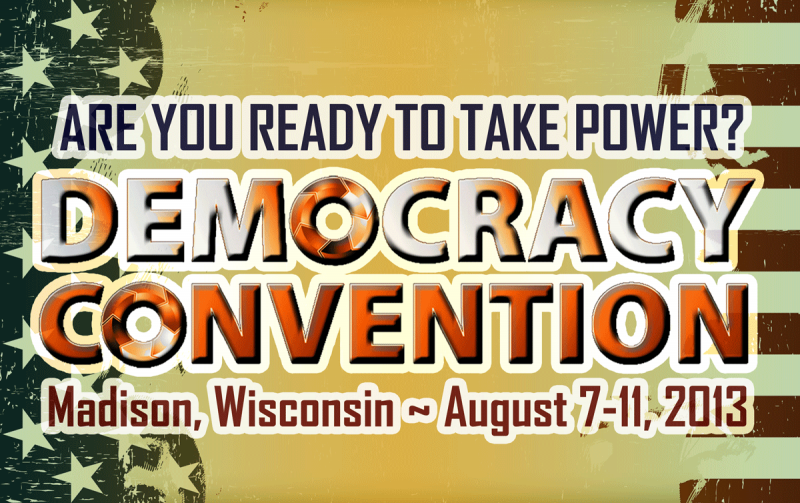
People are realizing they cannot make it in the current Wall Street dominated corporate capitalist economy — that it is not designed for most people to make it, but rather is designed for a small percentage to profit while everyone else is exploited and economically insecure. A new economic model is gravely needed and has, in fact, already taken root worldwide and increasingly in the US.
Two years ago, we organized the economic democracy track of the first national Democracy Convention. More than 1,000 people attended and the energy for creating real democracy was high. The second national Democracy Convention will take place this August 7 to 11 in Madison, Wis. Once again, It’s Our Economy is organizing the economic democracy track, this time in partnership with the Public Banking Institute. Our focus this year is to bring those who have been building the new economy together to share what they are learning so that participants can put new systems in place in their own communities.
Since 2011, efforts to build local economies and create affordable and sustainable supplies of the basic necessities have all advanced, and the potential for the future is amazing. Gar Alperovitz, a political economist who will be a speaker at the convention, recently had an article published in the New York Times about the vast potential of the aging baby boomer generation reaching retirement. Owners of businesses can take steps to transfer ownership of their businesses to their workers, which provides economic benefits to both the owners and the workers and builds the foundation for a new economy: worker ownership building the wealth in workers.
People are also questioning the way the economy is financed. At the conference the concept of money will be challenged by Jacqui Dunne, co-author of “Rethinking Money,” as we learn how communities are creating monetary systems that are based on values of dignity and collaboration rather than exploitation and competition. Kurt Von Mettenheim, an international expert in public banking, will give us the facts we need to make the public banking argument. And Marc Armstrong and Ellen Brown will share the experiences of the 20 states that have public banking supporters.
We will learn about efforts to end the debt-based economy and become participants in making local budget decisions. This conversation is coming at a critical time as countries, like Ecuador, have refused to pay some of their debts. In Europe people are investigating the legitimacy of debts, and in the U.S., the Strike Debt campaign is challenging the debt-based economy.
On Friday, August 9, we will hold a plenary session on the big picture of the economy, followed by a social event where you can meet the presenters and discuss these topics in more depth. We will also hold a workshop on the Trans-Pacific Partnership and the campaign to stop it.
Examples of a new economy – more local, sustainable and democratic – taking hold can be seen in a variety of areas. Food, for example. In the decade from 2001 to 2011, the U.S. organic food market grew by 238%, while the non-organic market only grew by 33%. Of course, at the same time there is a battle over food, with Monsanto helping to push the global corporate coup known as the Trans-Pacific Partnership which will allow their pesticide, GMO laden food to dominate the globe. Thankfully, people are organizing to stop the TPP.
We can also see it in banking. Not only is the public banking movement taking off, but credit unions are as well. Now credit unions have assets equal to the largest bank. As people are moving their money from big banks to credit unions, which are bank cooperatives, the big banks want to stifle that competition. The Wall Street banks, with the help of President Obama, want to remove a tax exemption that helps finance credit unions. Unlike banks, credit unions cannot raise capital through public stock offerings the way that banks can, and they have other limits on them as well. It's time to learn what we can do to push back against the financial power of Wall Street and create financial power in our communities.
We are also seeing a re-making of corporate charters. Corporations were originally formed – at their very beginning, in the pre-colonial era – to serve a public function but over the years they have transitioned to become only profit-making machines for their investors. Now, seven states have put the public benefit back into corporations by creating Benefit Corporations or B Corporations. As part of the mission of these corporations that need to provide a community benefit, their charter is no longer just about profit for investors.
But while the new economy built on democratization is growing, so are efforts to privatize public services. The conflict between public space and services, and space and services controlled by corporations, is heightening. More often people are seeing that privatization is a scam that in fact weakens services, making them more expensive and less universal. The conflict that is growing between privatization and democratization shows that blind support of corporate control is backfiring.
The Democracy Convention comes at an important moment. Since the first convention two years ago, it has become more evident that corporate capitalism is not working for most Americans and new alternatives are needed. At this conference people will see that new alternatives are taking root and growing. People are finding new solutions and creating a new economy designed to serve all of us, not just a few of us. We are in the midst of what Gar Alperovitz calls an “evolutionary transformation.” It is something we are all a part of. So join us in Madison and help participate in this transformation.
Kevin Zeese, JD and Margaret Flowers, MD are participants in PopularResistance.org. They co-direct It’s Our Economy and co-host Clearing the FOG shown on UStream TV and heard on radio.
3 WAYS TO SHOW YOUR SUPPORT
- Log in to post comments














